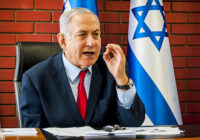The struggle is on over the ratification of the Iran deal, and Israelis are speaking out.
Prime Minister Binyamin Netanyahu and US Republicans are trying to create the impression that all Israelis are opposed to the deal with Iran, which is aimed at preventing it from achieving nuclear weapons.
In The New York Times, Thomas Friedman wrote a recent article titled, “If I were an Israeli looking at the Iran deal.”
Well, I’m an Israeli who lives in Tel Aviv and experienced Saddam Hussein’s Scud missiles raining down on the city in 1991, the ineffectual Hamas rockets that were blocked by the Iron Dome defense system in summer 2014, and who was on the front lines for eight months in the Israel Defense Forces (IDF) Combat Engineering Corps facing the Syrians with their then-chemical weapons potential during the 1973-74 Yom Kippur War. Since 1982, I have edited four publications that dealt with the danger of the nuclearization of the Israeli-Arab conflict and the quest for a Weapons of Mass Destruction Free Zone in the Middle East, and in recent years, I have participated in many regional encounters with prominent experts on the subject from Israel, Egypt, Saudi Arabia, Iran and the P5+1, which negotiated the deal.
When I look at the Iran agreement, I see a deal that prevents the Iranians from achieving nuclear weapons for the next 10-15 years and puts in place an inspection regime that will make it very difficult for Iran to ever pursue nuclear weapons without being detected. Therefore, I support the deal as being in the best interests of both Israel and the United States.
And I’m not alone. I am part of an initiative by a group of concerned Israeli citizens, many of them prominent academics, who are sending a letter to all members of the US Congress and Senate, which begins with the following sentences:
“We, the undersigned Israeli citizens, wish to congratulate the United States, Russia, China, France, Germany and the United Kingdom, upon reaching an agreement with Iran on its nuclear program.
“Thanks to the provisions outline in the agreement, and in particular the unprecedented inspection regime, this agreement provides the best assurance that Iran will not develop nuclear weapons for at least 15 years.
“As people who live in Israel, share the risks and are strongly committed to Israel’s security, we are confident that a diplomatic, peaceful solution represents the best chance of containing any potential nuclear threat.”
Israeli Security Experts Support the Deal
Independent security analyst Shmuel Meir—the former head of the Arms Control Branch in the IDF Strategic Planning Department, who writes a blog in Hebrew at Haaretz that deals primarily with nuclear affairs—recently wrote an in-depth piece about the agreement: “A detailed analysis of the Vienna deal shows that there is no basis for the dramatic scenario posited by Netanyahu.” He concluded that: “The agreement contains important positive implications for Israel’s security. Above all, it prevents Iran’s emergence as a new nuclear weapon state in the Middle East.” And he adds: “As a by-product, the agreement should prevent the development of a nuclear arms race in the Middle East, and the region’s transformation into a multi-nuclear arena.”
Another analysis by a veteran commander in the Israeli intelligence services, Avishay Ben Sasson Gordis, written for the Molad think tank, is titled: “Why the Nuclear Deal is Good for Israel.”
On August 13, Amir Oren, a security affairs commentator for Haaretz, wrote an article dubbed, “Netanyahu Must Stop Silencing Intel Chiefs Who Find Iran Deal Acceptable.” He stated: “There are those in the Intelligence Corps whose views on the nuclear agreement are at odds with Netanyahu’s position; their opinions are being kept from the public.”
The next day, on August 14, the lead story written again by Oren was devoted to “a unique document entitled ‘IDF Strategy,’” prepared by the new IDF chief of staff, Gadi Eizenkott, containing the Israeli army’s plans for the coming five years. The headline of the article was, “Eizenkot: Iran Isn’t the Main Threat to Israel.” In the piece, he noted: “Iran is mentioned as supporting Hezbollah and Hamas, not as a nuclear threat.”
We all recall how the entire Israeli security establishment, Mossad Head Meir Dagan, General Security Services Head Yuval Diskin, IDF Chief of Staff Gaby Ashkenazi and many others were opposed to Netanyahu’s plans to attack Iran’s nuclear facilities. So where are the voices of the current head of Mossad, the General Security Services, IDF Intelligence and the head of the National Security Council? Netanyahu seems insistent on making this a one-man show, and he is muzzling all of the others. If they were with him, he would be broadcasting their support loud and clear.
We do know that the former head of General Security Services, Ami Ayalon, believes the deal is “the best possible alternative from Israel’s point of view, given the other available alternatives.” While former Mossad Head Ephraim Halevy wrote: “A moment before we storm Capitol Hill, led by the Israeli ambassador to Washington, it’s important to hold a profound debate in Israel on whether no agreement is preferable to an agreement which includes components that are crucial for Israel’s security. There will be no other agreement and no other negotiations. What is better, a signed agreement or no agreement?”
And Uzi Even, a physics professor at Tel Aviv University who served as a scientist at the Dimona reactor, stated in an article: “I am sure the deal that was signed is preferable to the current situation because it delays Iran’s ability to develop a nuclear bomb by at least 15 years and in practice ends its nuclear aspirations. Don’t believe me? Look at the facts.”
Secretary of Energy Moniz: Israeli scientists influenced the deal
And speaking of scientists, in an interview with Yediot Ahronot’s American correspondent, Orly Azulay, US Secretary of Energy Ernest Moniz, a noted nuclear physicist, stated: “During the course of negotiations, Wendy Sherman [the under-secretary of state who coordinated the negotiating team, traveled to Israel to report and also to compare notes. We were in constant contact with Israeli scientists, and as a result of those important discussions, we have a stronger agreement.” Moniz went on to say: “The agreement gives us very strong monitoring mechanisms. I have tremendous confidence in the American, Israel, British and other intelligence services. At the foundation of the agreement lies our ability to ascertain whether the Iranians are doing what they agreed to … The risk of Iran being caught, if it goes in the wrong direction is very high.” Moniz also warned that “if Congress rejects the agreement, the global unity which has helped us so much will no longer be. We will be alone. The sanctions regime will collapse, and we will be facing a worst case scenario.”
To return to Thomas Friedman in The New York Times, toward the end of his article he wrote that “unfortunately, Israel has a prime minister whose strategy is to reject the Iran deal without any credible Plan B.”
Using even harsher words, Israel’s most widely read and influential political commentator, Nachum Barnea, wrote in Yediot Ahronot the following: “At this moment in the crisis Israel has no cabinet, no government, no security apparatus, no Knesset, no free press. Everything is being decided and determined according to the wishes of one man, Benjamin Netanyahu.”
Barnea then went on to recall Netanyahu’s expert testimony on Iraq in 2002, in which he advocated that America should overthrow the Iraqi regime. “Take out Saddam, [and] I guarantee that it will have enormous positive reverberations on the region,” which would lead to a ripple effect leading to positive change in Iran and the entire Middle East. He also spoke about the tremendous benefit of “applying power” in Afghanistan, talking about “the first victory in Afghanistan, leading to the second victory in Iraq,” etc.
Well, we all know how that turned out. Even Jeb Bush admits that Iraq was a mistake. But Netanyahu never seems to learn.
*[This article was originally published on The Times of Israel’s blog.]
The views expressed in this article are the author’s own and do not necessarily reflect Fair Observer’s editorial policy.
Photo Credit: A. Katz / Shutterstock.com
 We bring you perspectives from around the world. Help us to inform and educate. Your donation is tax-deductible. Join over 400 people to become a donor or you could choose to be a sponsor.
We bring you perspectives from around the world. Help us to inform and educate. Your donation is tax-deductible. Join over 400 people to become a donor or you could choose to be a sponsor.
Support Fair Observer
We rely on your support for our independence, diversity and quality.
For more than 10 years, Fair Observer has been free, fair and independent. No billionaire owns us, no advertisers control us. We are a reader-supported nonprofit. Unlike many other publications, we keep our content free for readers regardless of where they live or whether they can afford to pay. We have no paywalls and no ads.
In the post-truth era of fake news, echo chambers and filter bubbles, we publish a plurality of perspectives from around the world. Anyone can publish with us, but everyone goes through a rigorous editorial process. So, you get fact-checked, well-reasoned content instead of noise.
We publish 2,500+ voices from 90+ countries. We also conduct education and training programs
on subjects ranging from digital media and journalism to writing and critical thinking. This
doesn’t come cheap. Servers, editors, trainers and web developers cost
money.
Please consider supporting us on a regular basis as a recurring donor or a
sustaining member.
Will you support FO’s journalism?
We rely on your support for our independence, diversity and quality.







Comment